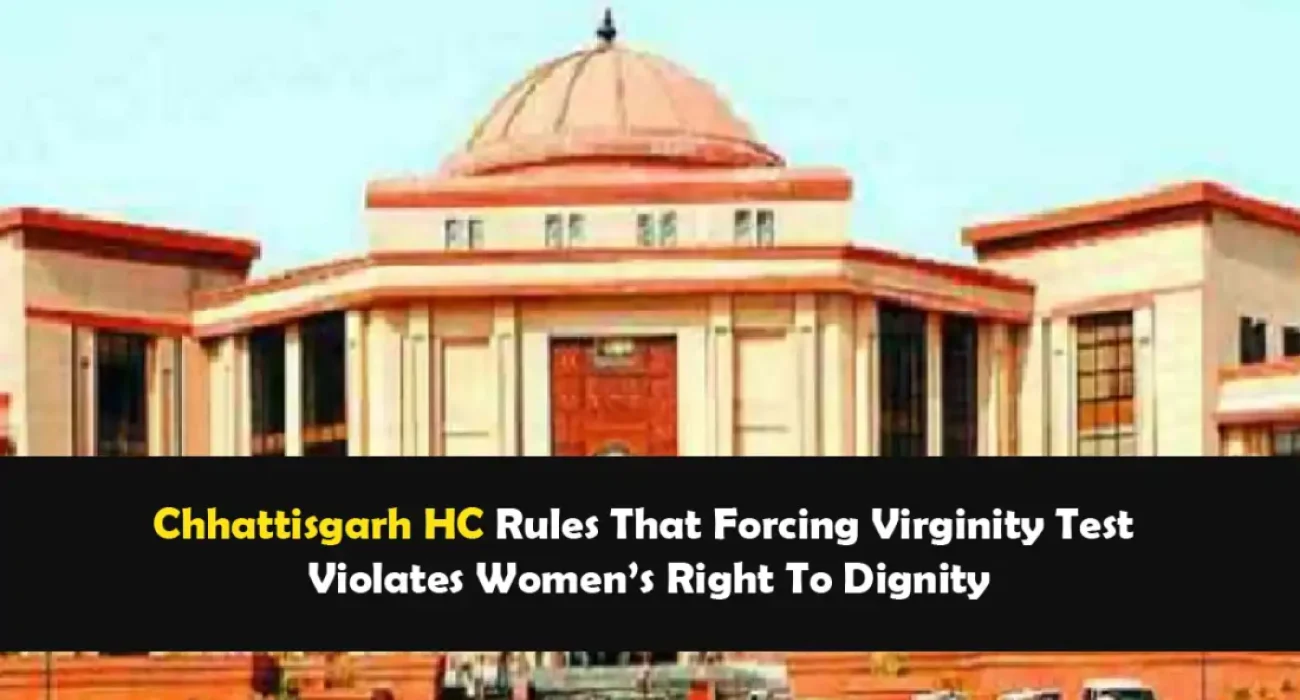

Table of Contents
ToggleThe matter arose out of a marital dispute between a couple who solemnized their marriage on April 30, 2023, following Hindu customs. After marriage, they began their conjugal life at the husband’s family residence in Barpali, Urga Tehsil, District Korba, Chhattisgarh. However, the wife soon confided in her father and other family members that the husband was impotent, and based on this claim, she refused to cohabit with him or establish a marital relationship. Consequently, on July 2, 2024, the wife filed an application under Section 144 of the Bharatiya Nagarik Suraksha Sanhita, 2023 (BNSS)—equivalent to Section 125 CrPC—before the Family Court in Raigarh, seeking monthly maintenance of ₹20,000.
While the application for maintenance was still under adjudication at the evidence stage, the husband filed an interim application before the same Family Court. He sought a medical directive for a virginity test on his wife. His contention was that no sexual intercourse had occurred between them and that the wife was allegedly involved in an illicit relationship with her jija (brother-in-law). The Family Court, however, rejected this plea on October 15, 2024. Aggrieved by this rejection, the husband approached the Chhattisgarh High Court under Section 19(4) of the Family Courts Act, 1984, filing a Criminal Revision Petition challenging the Family Court’s order.
The petitioner-husband contended that the Family Court erred in rejecting his request for a virginity test of the respondent-wife. According to him, since the wife had refused cohabitation citing his impotence, he was entitled to disprove her claims by establishing that she had never intended to consummate the marriage. He alleged that the wife was having an extra-marital affair with her brother-in-law and that this justified his demand for medical proof of her virginity. The petitioner further argued that allowing the test would expose the falsity of the wife’s accusations and bolster his defense in the maintenance proceedings.
The wife categorically denied the husband’s allegations. She maintained that her claim regarding the husband’s impotence was genuine and the basis for her refusal to cohabit. The wife opposed the plea for a virginity test, asserting that such a procedure was invasive, unscientific, and violative of her fundamental rights. She contended that the husband’s attempt to subject her to such a test was not only humiliating but also unconstitutional. According to her, the test had no legal relevance and was aimed solely at intimidating and shaming her during ongoing maintenance litigation.
Justice Arvind Kumar Verma of the Chhattisgarh High Court meticulously examined the legality of the husband’s demand for a virginity test. Relying on precedents set by the Supreme Court and High Courts, the Court emphasized the sanctity of a woman’s dignity and privacy under Article 21 of the Constitution.
The Court specifically cited the Supreme Court’s decision in State of Jharkhand v. Shailendra Kumar Rai, (2022), where it was held that “Any person who conducts the ‘two-finger test’ or per vaginum examination (while examining a person alleged to have been subjected to a sexual assault) in contravention of the directions of this Court shall be guilty of misconduct.”
Additionally, the Delhi High Court’s verdict in Sr. Sephy v. CBI & Ors., (2023) was referenced, which categorically ruled that “The virginity test conducted on a female detainee, accused under investigation, or in custody, whether judicial or police, is declared unconstitutional and in violation of Article 21 of the Constitution which includes right to dignity.”
Drawing upon these rulings, Justice Verma observed “Article 21 of the Constitution of India not only guarantees the right of life and personal liberty but also right to live with dignity, which is crucial for women. No woman can be forced to conduct her virginity test. It is the violation of fundamental right guaranteed under Article 21.”
The Court firmly stated that Article 21 is “the heart of fundamental rights”, and any violation of the dignity of women strikes at the core of this constitutional safeguard. The Judge also stressed that the husband had other legal avenues to challenge the allegation of impotence, such as undergoing medical examination himself or producing appropriate evidence.
The Court concluded “He cannot possibly be permitted to subject the wife to undergo her virginity test and fill up the lacuna in his evidence in this regard. Be that as it may, but in any case, granting the permission for virginity test of the respondent would be against her fundamental rights, the cardinal principles of natural justice and secret modesty of a female.”
In light of the above observations and established constitutional principles, the Chhattisgarh High Court dismissed the Criminal Revision Petition filed by the husband. It held that the Family Court’s order dated October 15, 2024, was just, reasonable, and free from any legal infirmity. The High Court reiterated that the demand for a virginity test was “unconstitutional and in violation of Article 21 of the Constitution which includes the right to dignity of the women.” Accordingly, the Court concluded that such a test could not be permitted under any circumstances and reaffirmed the fundamental right of every woman to live with dignity, privacy, and autonomy.
Credits: Adv. Deeksha Rai
IAW resources
Browse our help directory